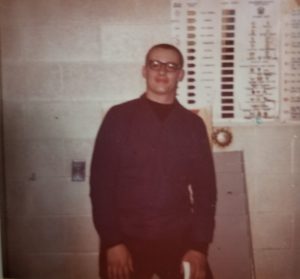10 Key Facts About Sedley Alley, Denied DNA Testing Before Execution
DNA testing could prove an innocent person was executed for the first time in history.
02.03.21 By Innocence Staff
Updated on Feb. 3, 2021, at 4 p.m. ET: In 2006, Tennessee executed Innocence Project client Sedley Alley after courts refused to test DNA evidence that may have proven his innocence.
Today, attorneys for April Alley, Mr. Alley’s daughter and executor of his estate, argued for the right to test the evidence before the Tennessee Court of Criminal Appeals.
“The purposes are exoneration and they are also finding the right person,” said attorney Paul Clement, of Kirkland & Ellis, who lead arguments for the Innocence Project on behalf of Ms. Alley.
“I have as much sympathy for the victims of a crime as imaginable, but their interests are not served if the wrong person has been executed for the crime and the actual perpetrator is at large, and that is exactly what the supreme court said in Powers, that interest extends.”
Watch the hearing:
Today’s arguments are a continuation of Ms. Alley’s fight for justice on behalf of her father. Her original petition for DNA testing was denied by the Shelby County Criminal Court in 2019, even though the Tennessee Supreme Court admitted its basis for denying testing in 2006, before Mr. Alley’s execution, was wrong and overruled it several years later in State v. Powers.
“It’s too late for my father, but it’s not too late to find the truth,” Ms. Alley said in 2019 following the petition filing.
“It’s too late for my father, but it’s not too late to find the truth.”
Ms. Alley has also requested that Governor Bill Lee order the DNA testing to posthumously pardon her father in the ultimate quest for truth and justice.
Reinvestigation of the 1985 rape and murder of Suzanne Marie Collins for which Mr. Alley was convicted, revealed that the evidence against him was weak and that he should never have been convicted in the first place.
Here are key facts you should know about this case and why the Innocence Project is pursuing the truth on behalf of the Alley family:
- The DNA evidence in Mr. Alley’s case has never been tested. Many items of evidence were requested to be tested, including a red pair of men’s underwear found near Ms. Collins’ body that police believed was worn by her attacker. DNA testing available prior to his execution might have excluded Mr. Alley as the perpetrator or provided a match with another man in the CODIS DNA database, but it was never undertaken.
- If Mr. Alley were alive today, he would be entitled to DNA testing. Under the 2011 ruling in Powers vs. State, Tennessee’s post-conviction DNA law provides for testing of the evidence in Mr. Alley’s case. The state’s post-conviction DNA analysis statute allows requests for testing to determine innocence at any time. It would be absurd to deny testing of the evidence because Mr. Alley was already executed. Though the test can no longer save his life, it could reveal the truth.

Sedley Alley in the Navy. Photo courtesy of the Alley family.
- The Tennessee Supreme Court affirmed it was wrong for the State to deny Mr. Alley DNA testing. In 2006, the Tennessee Board of Parole recommended that then Governor Bredesen stay Mr. Alley’s execution and order DNA testing. Instead of exercising his power to order DNA testing, the governor directed Mr. Alley’s defense team to present their request for testing to a trial court. The court ruled that it could not consider the ability of DNA testing to link crime scene evidence to a known individual through the CODIS database. The Tennessee appellate courts initially affirmed this decision, but reversed it in 2011.
- An expert in false confessions determined that Mr. Alley’s confession was likely false. According to Dr. Richard Leo, key details in Mr. Alley’s statement about how the crime was committed do not match the forensic evidence. For example, Mr. Alley’s confession states that he hit the victim with his car, however, autopsy records show that Ms. Collins was not hit by a vehicle. In his confession, Mr. Alley also stated that he stabbed Ms. Collins in the head with a screwdriver, however autopsy records show that she did not have such an injury. Finally, Mr. Alley told his daughter and members of his legal team that he was coerced into confessing. He was highly intoxicated on the night of the crime, had no recollection of committing the crime, and did not believe he had done it.
- Physical evidence from the crime scene does not match Mr. Alley. The tire tracks found at the crime scene were not from Mr. Alley’s vehicle and recovered shoe prints were inconsistent with his shoes.
- Key eyewitness accounts do not match Mr. Alley. A witness described a man near where Ms. Collins was abducted as 5’6-8” tall with short brown hair and a dark complexion who drove a station wagon. Mr. Alley was 6’4” tall, had red, medium-length hair, and a light complexion.
- New evidence points to other possible suspects. Thomas Bruce, who is now under indictment in St. Louis for homicide and might be a serial offender, was a student at the same avionics school as Ms. Collins in the months before her murder. And Ms. Collins’ boyfriend, who admitted he was with her the day of the murder, matched the description of eyewitnesses, as opposed to Sedley Alley, and owned an automobile that fit the description. This boyfriend also thought he was exclusively dating Ms. Collins, but she, in fact, had plans to move to California to marry a different man.
- There is no reason not to test the DNA evidence. DNA testing serves the public interest — and either Gov. Lee or the courts should order testing. If DNA testing shows Tennessee executed the wrong person in 2006 it could also identify the person who really committed the crime.
- If the DNA evidence from Mr. Alley’s case reveals another person as the guilty party, it will be the first time in history that DNA testing will have proven an innocent person was executed. One hundred seventy-four have been exonerated from death row for crimes they did not commit, including some people who were days away from execution.
- Religious leaders of the Shelby County community have called on District Attorney Amy Weirich to issue DNA testing. “Fairness and accuracy in the administration of justice is of great concern to us and our community,” 44 leaders wrote in a letter in 2019. “In that spirit, we implore you to agree to the requested DNA testing in Mr. Alley’s case.
Leave a Reply
Thank you for visiting us. You can learn more about how we consider cases here. Please avoid sharing any personal information in the comments below and join us in making this a hate-speech free and safe space for everyone.
June 9, 2021 at 8:41 am
February 10, 2021 at 8:10 pm
There is no legitimate reason for not testing the DNA other than to hide the probability that an innocent man was put to death without further investigation. It’s outrageous to refuse to test the DNA! Find out the truth!!

As a prior neighbor of Tom Bruce, I definitely want to see the testing done. Clear Mr Alley and punish the perp.